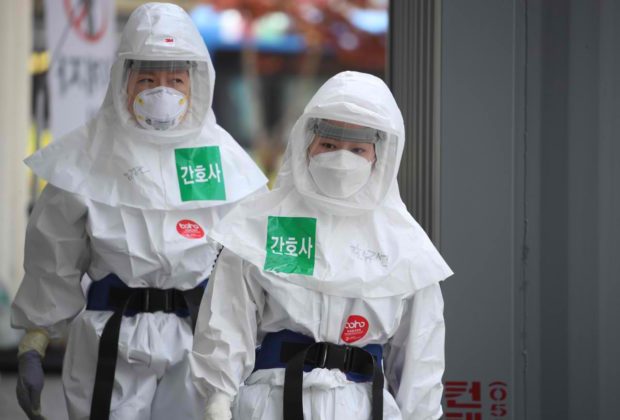SEOUL — South Korea’s daily infections of the new coronavirus stayed below 20 for the fourth straight day Tuesday as the country saw a marked slowdown in cluster infections linked to Itaewon, a nightlife district in Seoul.
But the country is facing yet another potential mass infection, this one tied to a major hospital in Seoul.
The new 13 cases of COVID-19 detected Monday brought the total caseload to 11,078, according to the Korea Centers for Disease Control and Prevention (KCDC). Of them, nine were local infections.
Itaewon emerged as a hotbed for cluster infections, with the number of cases tied to bars and clubs in the district reaching at least 170 as of Monday, according to the KCDC and the Seoul city government.
South Korea has successfully flattened the virus curve with massive testing and contact tracing, with its single-day infection falling to a single digit figure in the first week of May.
But the country saw a sharp rise in Itaewon-linked cases after a 29-year-old man tested positive on May 6 after visiting five clubs in the district in early May.
Despite a letup in club-linked infections, public health authorities remained vigilant against what they call “hidden spreaders.”
A 32-year-old Vietnamese virus patient who tested positive Sunday had visited a nightclub in Bucheon, just west of Seoul, early this month.
Adding to woes over community spread, four nurses at Samsung Medical Center, a major general hospital in Seoul, tested positive for the virus, according to Seoul Mayor Park Won-soon.
It marks the first time that medical workers from one of the country’s five major general hospitals have been infected with COVID-19.
Park said 265 of the 277 people, including health workers and patients, who were in contact with the infected nurses, are being checked for the virus, adding that parts of the hospital have been temporarily closed down.
The infection routes for the cases remain unknown. The first infected nurse neither visited Itaewon clubs nor came in contact with visitors to the multicultural neighborhood, according to Park.
“We urge citizens to implement quarantine steps in their daily routines as if we loosen our guard against the virus, new infections can occur at any time,” Yoon Tae-ho, a senior health official, said in a briefing.
The country added four more imported cases. It reported no additional death, bringing the death toll to 263. The fatality rate was 2.38 percent.
The total number of people released from quarantine after full recoveries stood at 9,938, up 34 from the previous day.
The country, with a population of more than 50 million, has carried out 765,574 tests since Jan. 3, including 12,363 the previous day.
As club-linked cases slowed, the country will reopen schools Wednesday starting from high school seniors as scheduled.
South Korea switched an “everyday life quarantine” scheme on May 6 to enable citizens to carry out social and economic activities under quarantine rules.
The KCDC said it will draw up specific quarantine measures that can be applied to highly crowded facilities, based on the risk of virus spread. Health authorities said they are considering mandatory imposition of core quarantine guidelines on such facilities. Yonhap
